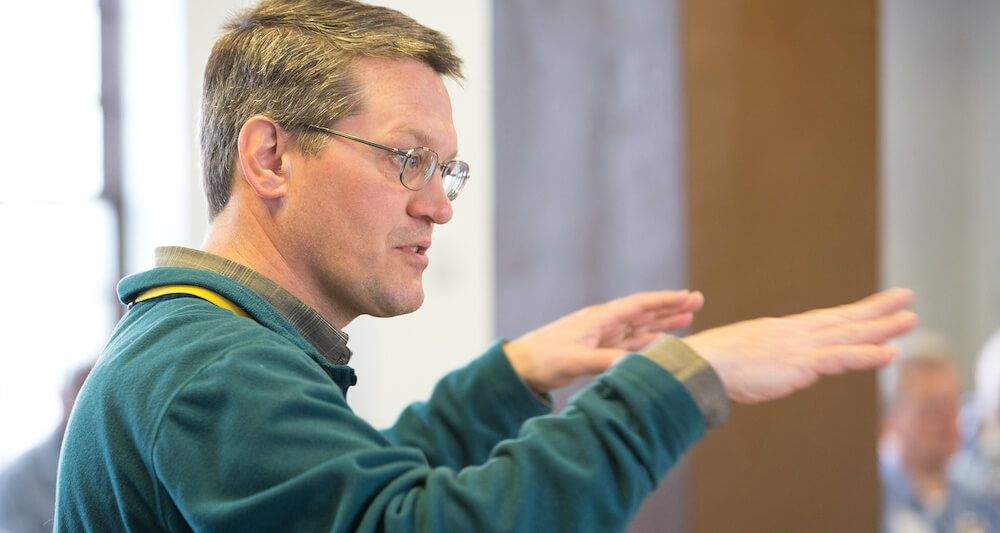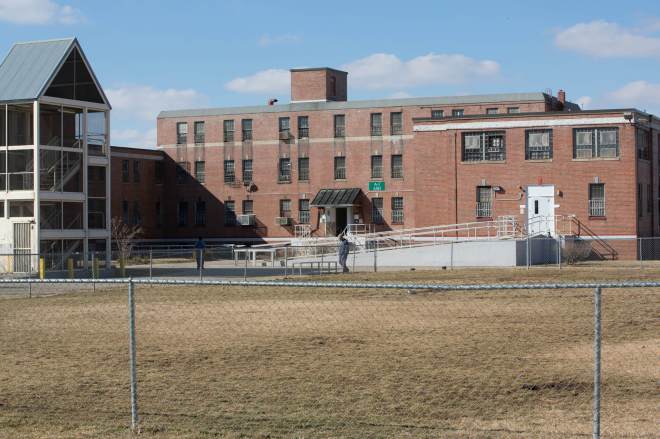From Darkness to Light: Transformation

By Richard Boone
May 2020 | ATLANTA
This article, written by the Rev. Dr. Richard Boone, a Church and Community Worker missionary with the West Ohio Conference and the Horizon Prison Initiative, is reprinted from New World Outlook, Fall 2017. It describes how human transformation sometimes takes a good deal of struggle for inner peace, quelling the guilt, regrets and violence within. Today, Boone cannot enter the prison because of coronavirus precautions and quarantine. He will resume when restrictions are lifted.
Each day I walk into a state prison – home to some 2,300 male inmates and about 500 staff. Most of the men in this prison don’t look or act any different than other people I meet in my town, but then there is John. When I first met John, it was a challenge for me to look into his eyes. John is about six feet tall, lean and strong; he always had this angry look, and tattoos cover his body, including his face. The tattoos were his way of telling the world to stay out of his face, that he was ready to fight. Getting past that angry mask took real focus to see into his eyes. As a pastor, and in my current role as a Church and Community Worker in the West Ohio Annual Conference assigned to the Horizon Prison Initiative, I meet people with tattoos and tongue piercings, but none as stark as John’s.

PHOTO: MICHAEL POLLARD/WEST OHIO CONFERENCE
My job title as the Horizon Program Coordinator sometimes leads inmates to think that I am employed by the state of Ohio. They are surprised to find out that I am a missionary, but they are still suspicious of my motives. Inmates whom John trusted vouched for me and told him I would not be wasting his time. I valued him and listened to his story.
Inside John was darkness that I could feel surrounding him. He was raised by violent criminals, and he was a member of a white supremacist gang that ran the streets with guns and drugs. He’s been in and out of prison since he was 15 years old. John considered the first man he beat up in prison to be a badge of honor and he’s jealously guarded his reputation through violence ever since.
But the violence and anger are not what truly made John’s soul dark. John’s real turmoil was that the person he hated most was himself. It seemed to me that he could not stand being present with his inner person. He described how he hated what he had done to others, he hated who he had become and yet he felt totally powerless to change. Worst of all, he hated that he could not drop the mask of violence for a second to let anyone else know how much pain he was in for fear that his enemies would smell his weakness. He had no hope of ever being a father to his sons, and his only confidence was that he would meet his sons inside the prison walls one day.
Darkness gives way
John accepted my invitation to be a participant in the Horizon program and moved into the Horizon dorm. Five mandatory classes, two elective classes and three family meetings a week added up to John having to open up about himself. Horizon’s strategy is not to give pat answers but to give people an opportunity to walk a path of spiritual growth through self-awareness, self-evaluation and self-surrender to God. Because everyone you live with is in your small groups and mandatory classes, Horizon is your 24-7, 365-day reality. John struggled with other “men in blue” holding him accountable to the rules of the Horizon agreement, but they did it out of a spirit of love and grace. One who had the same kind of traumatic past, the same experience of running the streets and the same burden of guilt built a relationship of mutual trust with John.
Within a year, John became a baptized believer in Christ. He is gentle and kind and protects the weaker guys in the Horizon dorm. He has a huge toothless grin, and I swear that even the tattoos on his face seem to smile. John studies the Bible for about two hours a day. It is his first time ever reading the Bible, so he comes up with some wild questions. Because of his violent background, he finds more truth in the stories of David and the Psalms of David than I have ever known. John has worked so hard on having a healthy sense of his inner wellbeing that I recruited him to be one of the leaders in our Horizon program. I believe that John’s experience of God’s unconditional offer of forgiveness is real. I see how God’s love, grace and mercy are at work in him. When I look into his eyes today, I see a shining light – a light that is stronger than any darkness.
Listen and love
Here is what I believe: The darkest place inside a prison is within a person. Even though John was honest enough to wear his darkness on his face, many inmates that look fine on the outside still have darkness inside. More importantly, most of the people we meet every day outside the prison hide darkness behind their masks.
To see the prison through the eyes of the inmates, I spend time listening to them. John Wesley interpreted Matthew 25:36 to say that to truly visit people in prison you must look into their eyes. Most religious volunteers come into prison to do ministry to inmates (not with them). The volunteers talk, preach, give advice, sing and dance, but they rarely listen. Ministry is what they are busy doing. In the very DNA of being Methodist is the tradition of building long-term relationships with people through small groups. I don’t walk into prison to be the hero, to be busy or to fix people. I figure authentic transformation of a human soul is God’s work. Kairos Prison Ministry says it well:
“Listen, Listen, Love, Love” (for more information see the Kairos website at www.KairosPrisonMinistry.org).
There is a cost to this kind of ministry. There are times when my heart is overwhelmed with the pain and trauma of the person I am present with. It feels like the darkness pulls me underground to a place devoid of love where there is no light. It creeps back sometimes, even when I sit with my family at church on Sunday morning. I believe it is the price that Jesus paid for me and my life is no longer about my personal comfort.
What led to the transformation of John from darkness to light? God’s love. Every time I have an opportunity to be trusted enough to go into the darkness and sit with a person, God is faithful to shine the light of the love of Christ. The prayer I pray each day before I enter the prison is, “God, your love is the most powerful force at work in the prison today, show me where you are at work today.” Fortunately, God’s love is not just working through me, the entire Horizon community is a city set on a hill full of men sharing God’s love.
The Rev. Dr. Richard Boone is a Church and Community Worker missionary (Advance #3022049) with the General Board of Global Ministries serving as the Horizon Prison Initiative coordinator, West Ohio Conference.
Since 2000, Horizon Prison Initiative has worked to transform prisoners who transform prisons and communities. Participants in our 10-month program work to discover and transform their faith, learn to live within a family and address the path that led them to prison. It’s a challenging emotional and spiritual journey, and it works: 91% of Horizon graduates who are released from prison stay out of prison. (The national rate is 33%.)
To learn more about this powerful program, visit horizonprisoninitiative.org or follow Horizon Prison Initiative on Facebook or LinkedIn.

